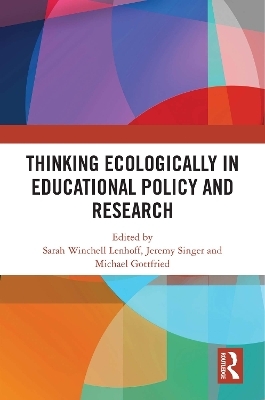
Thinking Ecologically in Educational Policy and Research
Routledge (Verlag)
978-1-032-60647-7 (ISBN)
Educational policy and politics have been dominated by school improvement initiatives that locate educational problems and solutions in schools themselves, rather than in the systemic and structural roots of those problems: segregation, poverty, and histories of compounding inequality. Youth outcomes that we associate with schools (e.g., achievement, attendance, graduation) are the consequences of systemic structural and environmental factors that interact with the lived experiences of students in their communities and schools. This insightful volume provides examples of how to understand and analyse educational issues ecologically and evidence on the opportunities and challenges with forging cross-sector partnerships to address educational issues ecologically.
Thinking Ecologically in Educational Policy and Research will be a key resource for practitioners and researchers of education leadership and policy, educational administration, educational research, educational studies and sociology. This book was originally published as a special issue of the Peabody Journal of Education.
Sarah Winchell Lenhoff, Ph.D., is the Leonard Kaplan Endowed Professor and Associate Professor of Educational Leadership and Policy Studies at Wayne State University, USA. She is the director of the Detroit Partnership for Education Equity & Research. Jeremy Singer, Ph.D., is a postdoctoral research associate with the Education Policy Innovation Collaborative at Michigan State University, USA, and a research affiliate of the Detroit Partnership for Education Equity & Research. He formerly taught in the Detroit Public Schools. Michael Gottfried, Ph.D., is Professor in the Graduate School of Education at the University of Pennsylvania, USA. His research focuses on education policy and the economics of education.
Introduction: Thinking Ecologically in Educational Policy and Research 1. Well-Being and Equity: A Multi-Disciplinary Framework for Rethinking Education Policy 2. Does Parental Involvement Change After Schools Assign Students an IEP? 3. Homelessness and School Choice: Examining the School Choice Experiences of Families Living in Shelter 4. Examining the English Learner Policy Ecology: How Educators Navigated the Provision of Designated English Language Development (ELD) Support at the Secondary Level 5. Open Enrollment and Disrupting the Political Ecology of U.S. Public Education 6. Coordinating the Mesosystem: An Ecological Approach to Addressing Chronic Absenteeism 7. Promoting Ecological Approaches to Educational Issues: Evidence from a Partnership around Chronic Absenteeism in Detroit 8. Beyond the School Walls: Collective Impact in Micropolitan School-Community Partnerships 9. An Application of the Social-ecological Systems Framework to Promoting Evidence-informed Policy and Practice Concluding Note on Thinking Ecologically in Educational Policy and Research
| Erscheinungsdatum | 02.03.2024 |
|---|---|
| Verlagsort | London |
| Sprache | englisch |
| Maße | 178 x 254 mm |
| Gewicht | 426 g |
| Themenwelt | Geisteswissenschaften ► Psychologie ► Allgemeine Psychologie |
| Geisteswissenschaften ► Psychologie ► Pädagogische Psychologie | |
| Sozialwissenschaften ► Pädagogik ► Vorschulpädagogik | |
| ISBN-10 | 1-032-60647-9 / 1032606479 |
| ISBN-13 | 978-1-032-60647-7 / 9781032606477 |
| Zustand | Neuware |
| Informationen gemäß Produktsicherheitsverordnung (GPSR) | |
| Haben Sie eine Frage zum Produkt? |
aus dem Bereich


